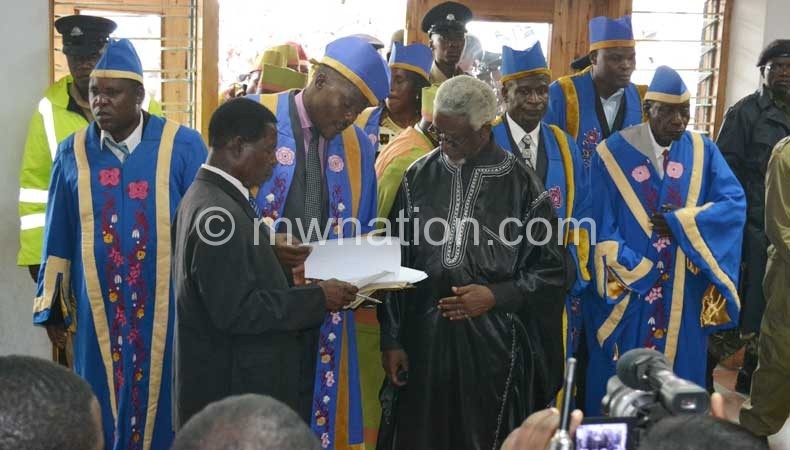Should chiefs meddle in politics?
Some traditional leaders under the umbrella of Chiefs Council has been holding a series of press meetings to denounce sentiments reportedly made by some political leaders at the recent Public Affairs Committee (Pac) All Inclusive Conference calling for President Peter Mutharika to stand down after 30 days for failing to run the country.
Malawi has been hailed for the strides it has made in providing an environment for free speech—as was shown at the conference by government critics—but some, not least the chiefs, believe the Pac conference provided too much room for dissent.
The senior traditional leaders—who included paramount chiefs Lundu and Kyungu and senior chiefs Kaomba, Lukwa and Kapeni—chided the politicians who were baying for Mutharika’s head and accused of planning to destabilise the country.
In an interview early this week Paramount Chief Lundu of Chikhwawa said the chiefs were only playing their role in ensuring the country enjoys peace and tranquillity.
“We are custodians of people of different traditions and political affiliations. We will not step aside and watch some people making statements that have the potential to ignite conflict in the country. We are only playing our rightful role of preserving public peace as provided for in the Chiefs Act,” he said.
An overview of the Law Reform Programme by the Malawi Law Commission questioned the ‘structural and institutional arrangement’ which places the chieftaincy directly under the supervision of the Office of the President and Cabinet (OPC) and the Minister of Local Government and Rural Development.
It reads in part: “Seemingly, this has politicised the institution of the chieftaincy as chiefs are always at the mercy of the government of the day.”
Renowned political analyst, Professor Blessings Chinsinga, observed that while chiefs might have an important role to play in society, the framework in which they operate is not compliant with the dictates of multiparty democracy.
“Chiefs can stand on the podium and claim that they are representing views of the people, it becomes difficult for them to claim they are neutral when their subjects have different political affiliations. The Chiefs Act is archaic and needs to be reviewed because it puts chiefs under a tight leash of the ruling party and its leadership. It would have been better to borrow a leaf from some countries where traditional leaders are just symbolic,” he said.
Chinsinga’s sentiments are in tandem with observations made in the Law Reform Programme report which highlighted the political cobwebs that senior chiefs especially find themselves into.
The report observed: “It has been observed that, by failing to clearly spell out the functions of Paramount Chief, the Chiefs Act contravenes the principles of accountability and transparency as enshrined under section 13 of the Constitution of Malawi. Clearly, the lack of clear and known functions of a paramount chief has given room to manipulation of chiefs as they are normally used in matters that have no bearing on their traditional functions.”
But Senior Chief Kapeni insisted that the failure by chiefs to speak out would take the country on a dangerous path to self-destruction.
“What we condemned were the dangerous statements some politicians made at the Pac conference. We are not against the parties but the essence of what was uttered. You are aware how such careless statements have triggered violence elsewhere on the continent and its devastating effects. We do not want that to happen here,” he said.
Chief Kapeni said the opposition should be providing solutions to the country’s problems and not issuing ultimatums.
“The issue of hunger should not be personalised, it is a common phenomena across the region so should not be attributed to this regime. That is what we are saying,” he added.
However, both Lundu and Kapeni were cagey when asked if the council would be equally critical of the ruling party or government officials if they took a stand that is against the people—whom the chiefs purport to represent.
While generally receptive to the importance of chiefs in preservation of national unity, Adam Kennedy of Machinga, feels chiefs should not speak on any political matter.
“If they want people to respect them, they should refrain from commenting on political issues. The problem is that once they start making such statements they are dividing the people further. So to me, it’s a case of better keep quiet than speak out,” he said.
But Hannah Mlangali from Bangwe, Blantyre said chiefs were right in their approach and should be commended for their role.
“There was nothing wrong in what the chiefs said. The only problem I see here is that the timing was wrong because it seemed as if they were reactive. The chiefs should always try to unify people of different backgrounds,” she said.





